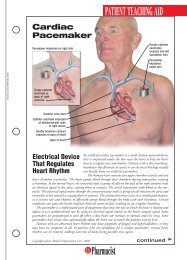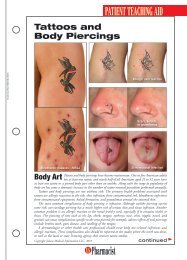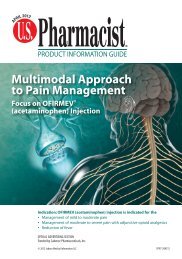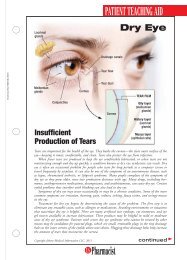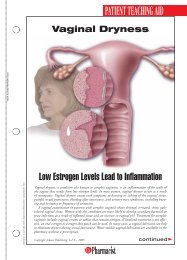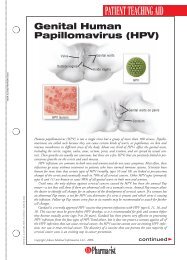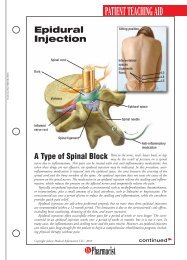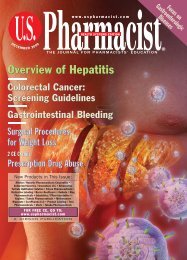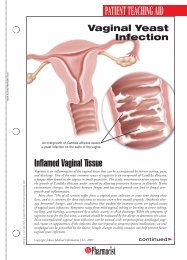Pharmacologic Managementof Alcohol Dependence© JUPITERIMAGESAlcohol dependence is a serious health concernthat is associated with many long-term consequences.Alcohol dependence not only affectsan individual’s physical health, but also may impactmental health and social well-being. Alcohol use is commonin the American population. According to the2008 National Survey on Drug Use and Health, morethan 50% of Americans aged 12 and older reporteddrinking, 23% reported binge drinking, and 6.9% wereheavy alcohol drinkers. 1 The prevalence rate of alcoholabuse or dependence in the United States is estimatedat 5% to 14%. 1-3Alcohol dependence is a chronic disorder that mayrequire maintenance treatment, similar to other medicalconditions such as hyperlipidemia and diabetes. 4It is believed that multiple neurotransmitters such asendogenous opioids, dopamine, serotonin, gammaaminobutyricacid (GABA), and glutamate may beeither directly or indirectly affected by alcohol. 4 Riskfactors such as genetics, environmental factors, and culturalattitudes may play a significant role in thedevelopment of alcohol dependence. 2The intent of this article is to review the pharmacologicmanagement of alcohol dependence; thereforealcohol withdrawal, although a crucial part of treatment,will not be discussed.Pharmacologic TherapyThe ultimate goals for patients with alcohol dependenceare to achieve abstinence and prevent relapse.Currently, the four pharmacologic agents that mayaid in accomplishing these goals are disulfiram, oralnaltrexone, injectable extended-release naltrexone, andacamprosate.Krina H. Patel, PharmDAssistant ProfessorPharmacy PracticeNesbitt College of Pharmacy and NursingWilkes UniversityWilkes Barre, PennsylvaniaDisulfiram: Disulfiram is an aversion-based treatmentthat acts by blocking aldehyde dehydrogenase(ALDH). This results inan increase in acetaldehyde levelswhen alcohol is consumed and inducesnegative effects such as dizziness,flushing, nausea, vomiting, hypotension,arrhythmia, convulsions, respiratory depression,and myocardial infarction. 4-6 The effects of this drugare sufficiently unpleasant to the patient to serve as adeterrent to consuming alcohol.Disulfiram in the absence of alcohol tends to causeminimal effects; however, drowsiness, metallic aftertaste,and hepatotoxicity may occur. 5 Severe cardiovasculardisease and concurrent use of metronidazole aretwo major contraindications associated with disulfiram.5 It is important not to administer disulfiram untilthe patient has abstained from alcohol for at least 12hours. Furthermore, since disulfiram irreversibly inhibitsALDH, alcohol consumption must be avoided for 2weeks after the last dose. 5There is a substantial amount of literature regardingthe use of disulfiram for alcohol dependence, butmany of these trials have significant methodologic weaknesses.6,7 Some of the data are inconsistent and maybe conflicting. 4,6 A Veterans Administration CooperativeStudy assessed 605 subjects assigned to disulfiram250 mg, disulfiram 1 mg, or placebo. 8 Thisstudy, conducted over 1 year, concluded that there wereno significant between-group differences in abstinencerates or time to first drink. The study did find, however,that patients receiving disulfiram 250 mg whoended up drinking reported fewer drinking days comparedwith the other two groups. 8Disulfiram is still utilized despite the conflictingdata. Disulfiram’s unique mechanism of action may bea powerful advantage for patients. Disulfiram may helpwith drinking outcomes such as reduced drinking daysor frequency; however, other outcomes, such as timeto first drink, abstinence, and alcohol consumption perunit of time, lack consistent evidence. 4,6 Althoughnot appropriate for all patients, disulfiram has a placein therapy for individuals seeking help with cessationof heavy drinking.Naltrexone: Naltrexone is a competitiveopioid receptor antagonist.Endogenous opioids are released inresponse to alcohol intake, thereby60U.S. <strong>Pharmacist</strong> • November 2009 • www.uspharmacist.com
PHARMACOLOGIC MANAGEMENT OF ALCOHOL DEPENDENCEcausing alcohol’s acute rewarding properties. Naltrexone’smechanism of action reduces cravings and alsois likely to minimize the “high” that individuals experiencewith alcohol intake, which may result in loweralcohol consumption. 7,9-12Naltrexone’s adverse-effect profile tends to bemild, but gastrointestinal side effects, headache,dizziness, anxiety, and decreased appetite may occur. 5Rarely, naltrexone may cause dose-related hepatotoxicity,so frequent monitoring is recommended. Owingto naltrexone’s mechanism of action, current opiatetreatment may induce withdrawal symptoms, so patientsshould be opioid-free for at least 7 to 10 days beforenaltrexone is initiated. 5Several studies have concluded that naltrexone is aneffective treatment option for alcohol dependence. In a12-week, double-blind, placebo-controlled trial, 70 malepatients were treated with naltrexone or placebo. 9 Patientswho received naltrexone experienced fewer cravings andconsumed less alcohol. The percentage of patients whorelapsed was significantly less in the naltrexone groupcompared with the placebo group (54% vs. 23%). Additionally,95% of placebo patients who sampled alcoholrelapsed, versus 50% of naltrexone patients. 9 Anothertrial established that naltrexone was superior toplacebo when outcomes such as number of drinkingdays, abstinence rates, relapse rates, and severity of alcohol-relatedproblems were compared. 12 This study foundthat abstinence rates were higher in the naltrexone groupversus the placebo group (61% vs. 19%). 12There are also some less compelling data regardingnaltrexone. One trial evaluated the use of naltrexonefor 3 months or 12 months in 627 veterans. 13 Naltrexonewas not significantly better than placebo in decreasingpercentage of drinking days or drinks per day,and it did not improve days to relapse. The trial concludedthat the use of naltrexone in this populationbase was not supported. 13Overall, naltrexone is an effective treatment optionfor patients with alcohol dependence. Based on the literature,naltrexone can help improve outcomes by lesseningcravings, decreasing heavy alcohol consumption,decreasing relapse, and potentially enhancing abstinencerates. 7,9-12Intramuscular (IM) Naltrexone: In 2006, the FDAapproved a long-acting IM formulation of naltrexone.Previous trials of naltrexone suggested that nonadherenceto treatment may be a concern, resulting indecreased effectiveness and suboptimal treatment outcomes.10,14 Use of the IM formulation may helpovercome problems with adherence. One concernregarding this formulation is the potential for injection-sitereactions such as cellulitis, hematoma, andnecrosis. 5Several trials support positive outcomes associatedwith the use of IM naltrexone. In one multicenter,randomized, placebo-controlled trial, 315 patientsreceived either IM naltrexone or placebo. 15 The trial,conducted over 3 months, found that IM naltrexonesignificantly improved abstinence rates compared withplacebo (18% vs. 10%), and also prolonged the timeto first drinking day. 15 Overall, IM naltrexone appearsto be a safe and effective treatment option that maybe especially beneficial for patients who have adherenceproblems. 16Acamprosate: In 2004, acamprosate became availablein the U.S. for the treatment of alcohol dependence.It is hypothesized that acamprosate restores GABA andglutamate imbalances caused by alcohol intake. 5,11 Italso is proposed that acamprosate has some effects onthe N-methyl-D-aspartic acid receptor. 11Some common adverse effects associated withacamprosate are diarrhea, headache, insomnia, anxiety,and muscle weakness. 5 Patients treated with acamprosateshould try their best to avoid alcohol; however, alcoholintake does not affect the pharmacokinetics of acamprosate,and therefore no disulfiram-type reaction willoccur. 5 In addition, acamprosate may be a safer optionthan disulfiram or naltrexone in patients with hepaticimpairment. The drug should be used with caution inpatients with renal impairment, however. 5Currently, there is insufficient U.S. literature stronglyevidencing the effectiveness of acamprosate, althoughan adequate amount of European literature supportsits use. 17-20 The COMBINE study, conducted in theU.S., concluded that acamprosate failed to show evidenceof efficacy with regard to time to first heavy drinkor abstinent days. 17 In another U.S.-based double-blind,placebo-controlled study, patients received acamprosate2 g, acamprosate 3 g, or placebo. 18 This study foundthat percentage of abstinent days did not differamong treatment groups; however, a post-hoc analysisthat controlled baseline covariates and measuredhighly motivated patients as a subset found that acamprosateyielded a greater number of abstinent days thanplacebo. 18A European meta-analysis of 20 trials suggested thatcontinuous abstinence rates at 6 months were significantlyhigher for acamprosate-treated patients versuspatients given placebo (36.1% vs. 23.4%). 19 Dataalso indicate that acamprosate confers improvedabstinence rates for up to 48 weeks. 20It is not clear why outcomes associated with acamprosateare inconsistent between the U.S. and Europeanstudies. Certain factors, such as the severity ofthe alcohol dependence, may be potential reasons. 4Based on the literature, acamprosate is associatedwith an improved rate of complete abstinence and mayhave other positive outcomes, such as decreased drinkingfrequency and rate of relapse. 7,18-20 The drug appears61U.S. <strong>Pharmacist</strong> • November 2009 • www.uspharmacist.com



